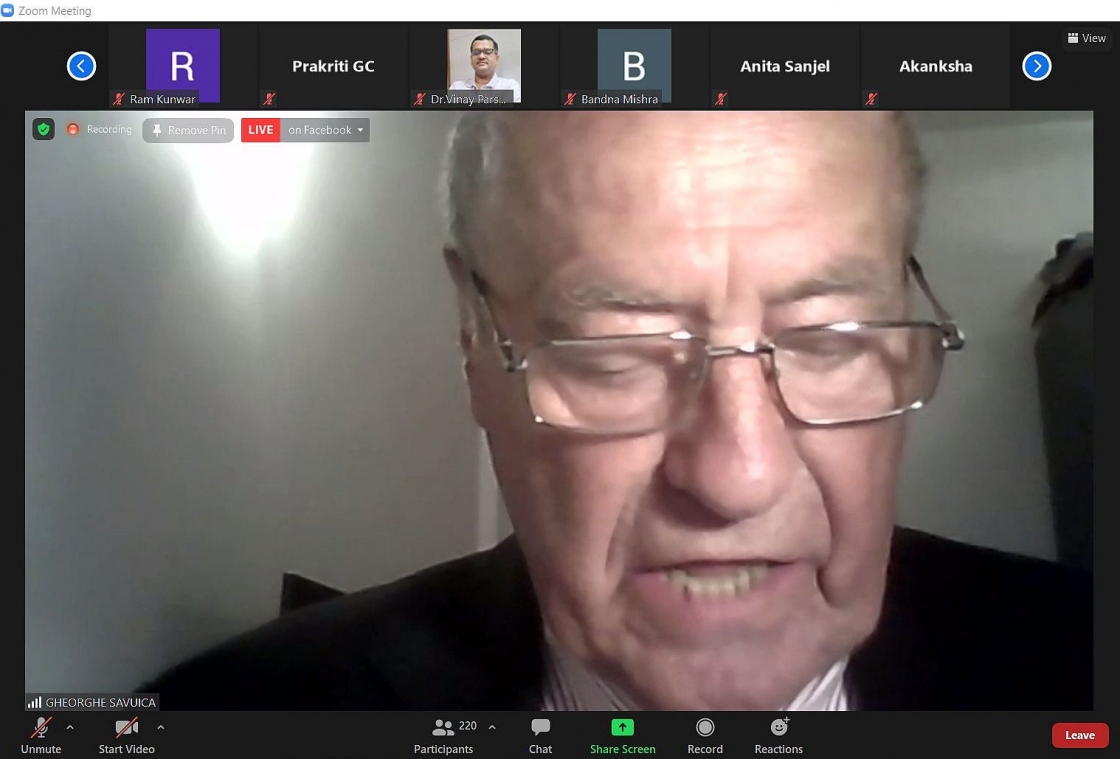Ambassador (p) Gheorghe Savuica, President and Founder of the Romanian Institute for Europe-Asia Studies(IRSEA), delivered a key-note speech at the Annual Conclave of the Nepal Institute for International Cooperation and Engagement on June 25, 2021.
As an independent, apolitical and non-partisan think-tank based in Nepal, NIICE believes in freedom, democracy and a world free from conflict and focuses on South Asia and China, in general, and India and China, in particular.
The three-day event brought together leaders, diplomats and scholars from Asia and around the world to analyse and discuss together, in an environment of respect and mutual understanding, the fast-changing geopolitics of the region. The 220 professionals and academics in the field of International Affairs debated over a large gamut of topics in International Affairs.
In his key-note speech during the inaugural session (available here), Ambassador (p) Savuica congratulated the organisers and manifested his firm belief that the event will not only lead to a better understanding of the global community by exchanging ideas in an environment of mutual respect, but it similarly represents a step forward in strengthening the robust cooperation between Europe and Asia.
In his intervention as a guest lecturer, Ambassador (p) Savuica participated in the panel dedicated to “Soft Power and Public Diplomacy”, analysing the Association of South-East Asian Nations’ evolution from model of regional development to Indo-Pacific soft-power projection. In his presentation, Ambassador (p) Savuica showcased ASEAN’s evolution and stressed on ASEAN’s Centrality in Southeast Asia and the Indo-Pacific, as an internationally recognised driving force in the regional architecture and unique venue of dialogue and soft power in the regional and global competition. Ambassador (p) Savuica manifested his strong belief that, true to its soft power capabilities, ASEAN is not taking sides in the political game in East and South East Asia, as well as in the Indo-Pacific region. Ambassador (p) Savuica’s presentation is available here.
IRSEA’s Director of Programmes commented over the recent dynamics of the Central and Eastern Europe-China cooperation framework (“16+1”), presenting the preliminary research findings of an on-going research project of the Institute. His presentation is available here.
As co-organiser of the event, along with multiple prestigious think-tanks and research institutions, such as the Elliott School of International Affairs, George Washington University, Washington DC, United States of America, Institute of South Asian Studies, National University of Singapore, Centre for Chinese and South East Asian Studies, Jawaharlal Nehru University, New Delhi, India, School of Public Affairs, American University, Washington DC, United States of America, Center for South Asian Studies, Fudan University, Shanghai, China, Institute of China Studies, University of Malaya, Kuala Lumpur, Malaysia, Institute of Asian Studies, Chulalongkorn University, Bangkok, Thailand, United Service Institution of India, New Delhi, India, Global South Studies Center, University of Cologne, Köln, Germany, South Asia Democratic Forum, Brussels, Belgium, Institute of Bay of Bengal Studies, Shenzhen University, Shenzhen, China, Institute of National Security Studies, Colombo, Sri Lanka, Bharat Center of Canada, Toronto, Canada, Bangladesh Enterprise Institute, Dhaka, Bangladesh and the Center for Asia Leadership, Boston, USA and Kuala Lampur, Malaysia, the Romanian Institute for Europe-Asia Studies attaches a great importance to academic international engagement and collaborative research projects as venues of a more robust interaction across continents, in the spirit of mutual respect and partnership.

